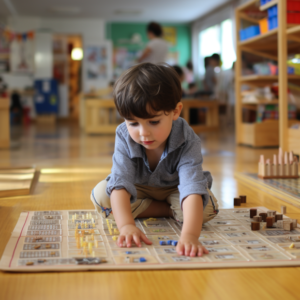The Montessori method places great emphasis on the importance of sensory education in a child’s development. Dr. Maria Montessori recognized the critical role that sensory experiences play in shaping a child’s understanding of the world. In this article, we will explore the concept of sensory education within the Montessori approach and how it nurtures a child’s natural curiosity and cognitive growth.
- The Sensitive Period for Sensory Development
Montessori believed that children have sensitive periods during which they are particularly receptive to specific stimuli. The early years of life are marked by heightened sensitivity to sensory experiences, making it an optimal time for sensory education. - The Senses as the Gateway to Learning
In the Montessori classroom, learning materials are designed to engage the child’s senses actively. Through hands-on exploration, children refine their senses and develop a deeper understanding of concepts like size, shape, texture, sound, and color. - Sensorial Materials: Purpose and Benefits
Montessori sensorial materials are carefully crafted to isolate specific sensory attributes. These materials help children explore and compare different qualities, fostering an understanding of abstract concepts and refining their powers of observation. - Developing Concentration and Focus
The sensory activities in a Montessori environment support the development of concentration and focus. As children engage with the materials, they enter a state of deep concentration, promoting inner discipline and a sense of satisfaction from their accomplishments. - Order and Precision in Sensory Activities
Montessori sensory education also emphasizes order and precision. Through repetition and refinement of movements, children develop their fine motor skills and attention to detail, laying the foundation for later academic pursuits. - Preparing the Senses for Academic Learning
Sensory education paves the way for later academic learning. As children gain confidence in exploring the world through their senses, they are better equipped to absorb complex information in subjects like mathematics, language, and science. - Cultivating Awareness and Mindfulness
Engaging with sensory experiences in a purposeful and deliberate manner fosters mindfulness and awareness in children. They learn to be present in the moment and appreciate the richness of their surroundings. - A Holistic Approach to Learning
In the Montessori perspective, sensory education is an integral part of a holistic approach to learning. By addressing the whole child—physical, emotional, and cognitive development—the Montessori method nurtures well-rounded individuals.
Conclusion:
Sensory education lies at the heart of the Montessori philosophy, recognizing the profound impact sensory experiences have on a child’s growth and learning. By providing a rich sensory environment and carefully designed materials, Montessori educators empower children to explore, discover, and make sense of the world around them. Sensory education is not just about sensory input; it is a powerful tool that cultivates curiosity, concentration, and a love for lifelong learning in every child.

